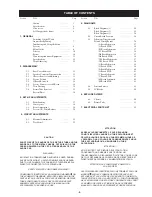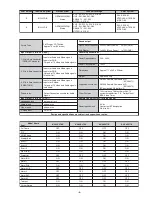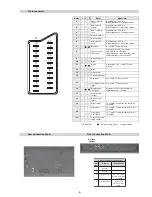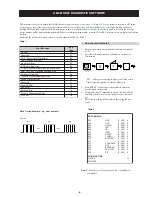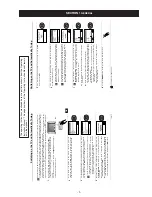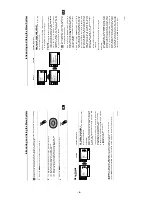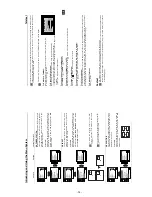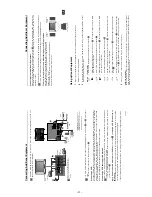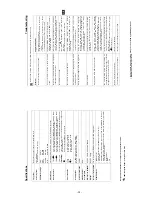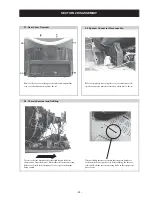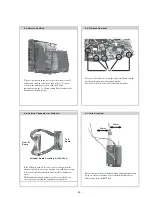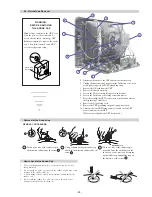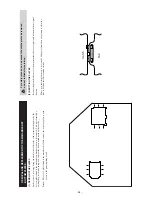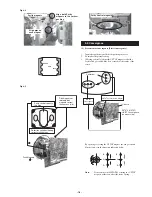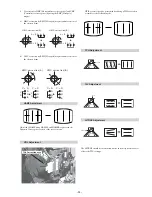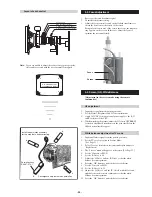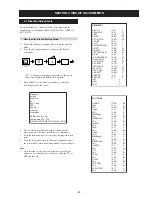
- 6 -
e
g
a
s
s
e
M
r
o
r
r
E
D
E
L
e
d
o
C
r
o
r
r
e
o
N
0
0
d
e
v
r
e
s
e
R
1
0
)
n
o
i
t
c
e
t
o
r
P
t
n
e
r
r
u
C
r
e
v
O
(
P
C
O
2
0
n
o
i
t
c
e
t
o
r
P
e
g
a
t
l
o
V
r
e
v
O
3
0
c
n
y
S
l
a
c
i
t
r
e
V
o
N
4
0
n
o
r
e
w
o
p
t
a
r
o
r
r
E
R
K
I
5
0
n
o
r
e
w
o
p
t
a
w
o
l
s
e
n
il
a
t
a
d
r
o
/
d
n
a
k
c
o
l
c
s
u
b
C
I
I
6
0
n
o
r
e
w
o
p
t
a
e
g
d
e
l
w
o
n
k
c
a
s
u
b
C
I
I
o
n
M
V
N
7
0
n
o
i
t
c
e
t
o
r
P
l
a
t
n
o
z
i
r
o
H
8
0
n
o
r
e
w
o
p
t
a
e
g
d
e
l
w
o
n
k
c
a
o
n
r
e
n
u
T
9
0
r
o
r
r
E
r
o
s
s
e
c
o
r
P
d
n
u
o
S
0
1
d
e
v
r
e
s
e
R
1
1
r
o
r
r
E
e
t
a
r
n
a
c
S
2
1
r
o
r
r
E
C
A
D
3
1
r
o
r
r
E
d
n
e
k
c
a
B
4
1
r
o
r
r
E
e
c
n
e
g
r
e
v
n
o
C
c
i
m
a
n
y
D
5
1
r
o
r
r
E
P
I
P
6
1
AE-6B SELF DIAGNOSTIC SOFTWARE
The identification of errors within the AE-6B chassis is triggered in one of two ways :- 1: Busy or 2: Device failure to respond to IIC. In the
event of one of these situations arising the software will first try to release the bus if busy (Failure to do so will report with a continuous
flashing LED) and then communicate with each device in turn to establish if a device is faulty. If a device is found to be faulty the relevant
device number will be displayed through the LED (Series of flashes which must be counted) See table 1, non fatal errors are reported using this
method.
Each time the software detects an error it is stored within the NVM. See Table 2.
Table 1
How to enter into Table 2
Table 2
Note:
To clear the error count data press ‘80’ on the Remote
commander.
U
N
E
M
R
O
R
R
E
2
0
E
3
0
E
4
0
E
5
0
E
6
0
E
7
0
E
8
0
E
9
0
E
0
1
E
1
1
E
2
1
E
3
1
E
4
1
E
5
1
E
6
1
E
E
M
I
T
G
N
I
K
R
O
W
S
R
U
O
H
S
E
T
U
N
I
M
P
C
O
P
V
O
C
N
Y
S
V
R
K
I
C
I
I
M
V
N
T
O
R
P
H
R
E
N
U
T
P
D
N
U
O
S
-
E
T
A
R
N
A
C
S
C
A
D
D
N
E
K
C
A
B
N
O
C
N
Y
D
P
I
P
)
5
5
2
,
0
(
)
5
5
2
,
0
(
)
5
5
2
,
0
(
)
5
5
2
,
0
(
)
5
5
2
,
0
(
)
5
5
2
,
0
(
)
5
5
2
,
0
(
)
5
5
2
,
0
(
)
5
5
2
,
0
(
)
5
5
2
,
0
(
)
5
5
2
,
0
(
)
5
5
2
,
0
(
)
5
5
2
,
0
(
)
5
5
2
,
0
(
)
5
5
2
,
0
(
0
0
0
0
0
0
0
0
0
0
0
0
0
0
0
4
1
7
Flash Timing Example : e.g. error number 3
StBy LED
ON
ON
ON
OFF
OFF
‘TT—’ will appear in the upper right corner of the screen.
Other status information will also be displayed.
3.
Press ‘MENU’ on the remote commander to obtain the
Service menu on the screen.
4.
Using the Remote Commander, Scroll to the ‘Error Menu’
item using the down arrow key, then press the right arrow
key.
5.
The following table will be displayed indicating the error
count.
i+
5
+
(ON SCREEN (DIGIT 5) () (TV)
DISPLAY)
1.
Turn on the main power switch and enter into the stand-by
mode.
2.
Press the following sequence of buttons on the Remote
Commander.


